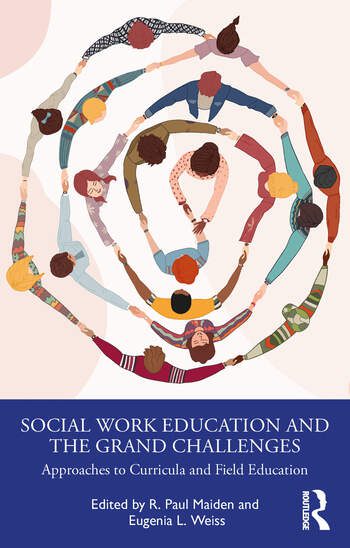A new exciting book, edited by R. Paul Maiden and Eugenia L. Weiss, examines the application of the Grand Challenges for Social Work into social work curricula and field education. The following excerpt from the Preface describes the intention and structure of the book. Learn more here!
“Our conceptualization for this book would be as a teaching and curricular guide for faculty to use in the application of the Grand Challenges in social work curricula at both undergraduate and graduate levels. Additionally, this volume is intended to serve as a handbook of how this can be best achieved in alignment with the newest Educational Policy and Accreditation Standards (EPAS) from the Council of Social Work Education (CSWE, 2022).
Each chapter is generally structured to introduce a Grand Challenge and situate it within the foundation year curricular domains, such as Human Behavior and the Social Environment (HBSE), Social Work Policy and/or Practice courses. Teaching practices are presented in at least one of the curricular domains along with student learning objectives. We have asked our contributing authors to set the stage in terms of how to prepare students for learning and classroom engagement with the GCSW topic (mostly for in-person teaching) and to describe the highlights of some example lecture material to be provided to the students. The authors also describe how an instructor can best facilitate class discussions around the Grand Challenge and/or provide classroom exercises. Addressing diversity, equity, and inclusion are also part of the teaching topics for each chapter as well as how to manage difficult classroom conversations. Lastly, the chapters offer tips on evaluating student learning and provide any supplementary teaching materials or areas for future teaching/curricular considerations.
The Appendices contain the identified EPAS for each of the Grand Challenge chapters so that instructors can embed these into their syllabi as applicable. The reader will also find four chapters that are not directly related to the Grand Challenges but offer insights into various areas for teaching and curricular guidance. For example, Chapter 1 provides the research on the use of the Grand Challenges in social work education, and we would argue, the rationale for this book. The use of simulation labs for undergraduate education (Chapter 15) provides an innovative way to teach Grand Challenges in the field. The general application of Grand Challenges in field education (Chapter 16) offers the reader a field perspective as our signature pedagogy. Lastly, Chapter 17, on evaluation capacity building for organizations during the closures associated with COVID-19, provides concepts associated with program accountability that can be applied across the Grand Challenges. ”
Learn more about this new book here!

